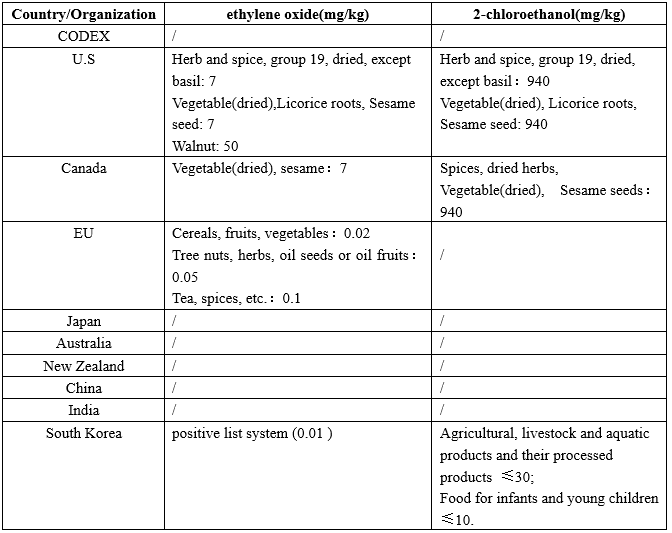Last time, we briefly introduced the detection of carcinogenic ethylene oxide metabolites in Korean instant noodles and the reason for notification. This time we will introduce the supervision of ethylene oxide and 2-chloroethanol in various countries. How to deal with it?
A. Regulation of ethylene oxide and 2-chloroethanol in various countries
Ethylene oxide is an unregistered pesticide in South Korea and is managed in accordance with the positive list system (0.01 ppm), while 2-chloroethanol can be derived from the environment or naturally produced, and South Korea does not set a residue limit standard. Through this incident, Korean MFDS has set its temporary limit standards, that is, agricultural, livestock and aquatic products and their processed products ≤30㎎/㎏, and food for infants and young children ≤10㎎/㎏.
In addition, the United States and Canada are also different from the European Union in that 2-chloroethanol and ethylene oxide are managed separately. Other countries have not set standards, and the specific requirements of each country are as follows:
B. Suggestion for companies
Through the above incidents, we can see that different countries have different regulations on ethylene oxide and 2-chloroethanol, which directly affect the import and export trade of food and the purchasing power of consumers. Foodmate provides the following suggestions for your reference:
(1) Food companies should improve product quality, strictly control product quality throughout the entire process from raw materials to product production, realize the traceability management of the entire product process. Focus on problems and take corrective measures in a timely manner.
(2) Food companies should actively understand the requirements of relevant domestic and foreign standards and regulations, and understand the possible risk points of similar products in order to take timely measures to avoid risks.
(3) Government regulatory agencies actively collect food-related safety incidents domestic and overseas, refer to foreign regulations and standards, regularly carry out relevant risk assessments, and improve relevant domestic regulations and standards to guide export companies to avoid similar risks.
The above is Foodmate's progress on the detection of carcinogenic ethylene oxide metabolites in Korean instant noodles and related content such as the supervision of ethylene oxide and 2-chloroethanol in various countries. I hope it will be helpful to you.


